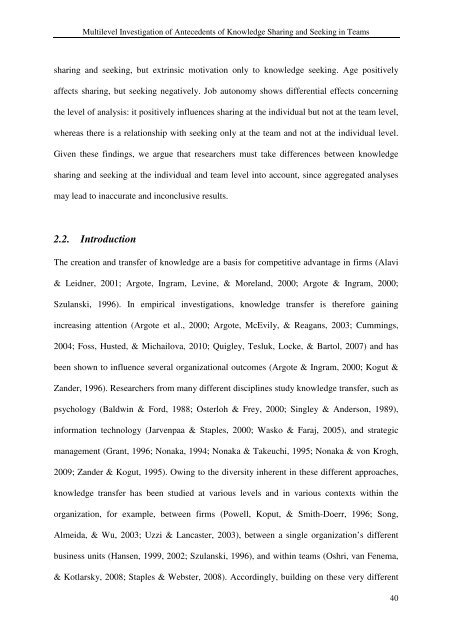thesis_Daniela Noethen_print final - Jacobs University
thesis_Daniela Noethen_print final - Jacobs University
thesis_Daniela Noethen_print final - Jacobs University
Create successful ePaper yourself
Turn your PDF publications into a flip-book with our unique Google optimized e-Paper software.
Multilevel Investigation of Antecedents of Knowledge Sharing and Seeking in Teams<br />
sharing and seeking, but extrinsic motivation only to knowledge seeking. Age positively<br />
affects sharing, but seeking negatively. Job autonomy shows differential effects concerning<br />
the level of analysis: it positively influences sharing at the individual but not at the team level,<br />
whereas there is a relationship with seeking only at the team and not at the individual level.<br />
Given these findings, we argue that researchers must take differences between knowledge<br />
sharing and seeking at the individual and team level into account, since aggregated analyses<br />
may lead to inaccurate and inconclusive results.<br />
2.2. Introduction<br />
The creation and transfer of knowledge are a basis for competitive advantage in firms (Alavi<br />
& Leidner, 2001; Argote, Ingram, Levine, & Moreland, 2000; Argote & Ingram, 2000;<br />
Szulanski, 1996). In empirical investigations, knowledge transfer is therefore gaining<br />
increasing attention (Argote et al., 2000; Argote, McEvily, & Reagans, 2003; Cummings,<br />
2004; Foss, Husted, & Michailova, 2010; Quigley, Tesluk, Locke, & Bartol, 2007) and has<br />
been shown to influence several organizational outcomes (Argote & Ingram, 2000; Kogut &<br />
Zander, 1996). Researchers from many different disciplines study knowledge transfer, such as<br />
psychology (Baldwin & Ford, 1988; Osterloh & Frey, 2000; Singley & Anderson, 1989),<br />
information technology (Jarvenpaa & Staples, 2000; Wasko & Faraj, 2005), and strategic<br />
management (Grant, 1996; Nonaka, 1994; Nonaka & Takeuchi, 1995; Nonaka & von Krogh,<br />
2009; Zander & Kogut, 1995). Owing to the diversity inherent in these different approaches,<br />
knowledge transfer has been studied at various levels and in various contexts within the<br />
organization, for example, between firms (Powell, Koput, & Smith-Doerr, 1996; Song,<br />
Almeida, & Wu, 2003; Uzzi & Lancaster, 2003), between a single organization’s different<br />
business units (Hansen, 1999, 2002; Szulanski, 1996), and within teams (Oshri, van Fenema,<br />
& Kotlarsky, 2008; Staples & Webster, 2008). Accordingly, building on these very different<br />
40

















